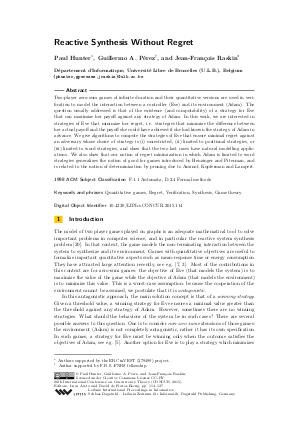Reactive Synthesis Without Regret
Authors Paul Hunter, Guillermo A. Pérez, Jean-François Raskin
-
Part of:
Volume:
26th International Conference on Concurrency Theory (CONCUR 2015)
Part of: Series: Leibniz International Proceedings in Informatics (LIPIcs)
Part of: Conference: International Conference on Concurrency Theory (CONCUR) - License:
 Creative Commons Attribution 3.0 Unported license
Creative Commons Attribution 3.0 Unported license
- Publication Date: 2015-08-26
File

PDF
LIPIcs.CONCUR.2015.114.pdf
- Filesize: 0.52 MB
- 14 pages
Document Identifiers
Subject Classification
Keywords
- Quantitative games
- regret
- verification
- synthesis
- game theory
Metrics
- Access Statistics
-
Total Accesses (updated on a weekly basis)
0Document
0Metadata
Abstract
Two-player zero-sum games of infinite duration and their quantitative versions are used in verification to model the interaction between a controller (Eve) and its environment (Adam). The question usually addressed is that of the existence (and computability) of a strategy for Eve that can maximize her payoff against any strategy of Adam. In this work, we are interested in strategies of Eve that minimize her regret, i.e. strategies that minimize the difference between her actual payoff and the payoff she could have achieved if she had known the strategy of Adam in advance. We give algorithms to compute the strategies of Eve that ensure minimal regret against an adversary whose choice of strategy is (i) unrestricted, (ii) limited to positional strategies, or (iii) limited to word strategies, and show that the two last cases have natural modelling applications. We also show that our notion of regret minimization in which Adam is limited to word strategies generalizes the notion of good for games introduced by Henzinger and Piterman, and is related to the notion of determinization by pruning due to Aminof, Kupferman and Lampert.
Cite As Get BibTex
Paul Hunter, Guillermo A. Pérez, and Jean-François Raskin. Reactive Synthesis Without Regret. In 26th International Conference on Concurrency Theory (CONCUR 2015). Leibniz International Proceedings in Informatics (LIPIcs), Volume 42, pp. 114-127, Schloss Dagstuhl – Leibniz-Zentrum für Informatik (2015)
https://doi.org/10.4230/LIPIcs.CONCUR.2015.114
BibTex
@InProceedings{hunter_et_al:LIPIcs.CONCUR.2015.114,
author = {Hunter, Paul and P\'{e}rez, Guillermo A. and Raskin, Jean-Fran\c{c}ois},
title = {{Reactive Synthesis Without Regret}},
booktitle = {26th International Conference on Concurrency Theory (CONCUR 2015)},
pages = {114--127},
series = {Leibniz International Proceedings in Informatics (LIPIcs)},
ISBN = {978-3-939897-91-0},
ISSN = {1868-8969},
year = {2015},
volume = {42},
editor = {Aceto, Luca and de Frutos Escrig, David},
publisher = {Schloss Dagstuhl -- Leibniz-Zentrum f{\"u}r Informatik},
address = {Dagstuhl, Germany},
URL = {https://drops.dagstuhl.de/entities/document/10.4230/LIPIcs.CONCUR.2015.114},
URN = {urn:nbn:de:0030-drops-53675},
doi = {10.4230/LIPIcs.CONCUR.2015.114},
annote = {Keywords: Quantitative games, regret, verification, synthesis, game theory}
}
Author Details
References
-
Benjamin Aminof, Orna Kupferman, and Robby Lampert. Reasoning about online algorithms with weighted automata. ACM Transactions on Algorithms, 2010.

-
David E. Bell. Regret in decision making under uncertainty. Operations Research, 30(5):961-981, 1982.

-
Lubos Brim, Jakub Chaloupka, Laurent Doyen, Raffaella Gentilini, and Jean-François Raskin. Faster algorithms for mean-payoff games. Formal Methods in System Design, 38(2):97-118, 2011.

-
Arindam Chakrabarti, Luca de Alfaro, Thomas A. Henzinger, and Mariëlle Stoelinga. Resource interfaces. In EMSOFT, volume 2855 of LNCS, pages 117-133. Springer, 2003.

-
Krishnendu Chatterjee, Laurent Doyen, Emmanuel Filiot, and Jean-François Raskin. Doomsday equilibria for omega-regular games. In VMCAI, volume 8318, pages 78-97. Springer, 2014.

-
Krishnendu Chatterjee, Laurent Doyen, and Thomas A. Henzinger. Quantitative languages. ACM Trans. Comput. Log., 11(4), 2010.

-
Krishnendu Chatterjee, Laurent Doyen, Thomas A. Henzinger, and Jean-François Raskin. Generalized mean-payoff and energy games. In FSTTCS, pages 505-516, 2010.

-
Werner Damm and Bernd Finkbeiner. Does it pay to extend the perimeter of a world model? In FM, volume 6664 of LNCS, pages 12-26. Springer, 2011.

-
Aldric Degorre, Laurent Doyen, Raffaella Gentilini, Jean-François Raskin, and Szymon Toruńczyk. Energy and mean-payoff games with imperfect information. In CSL, pages 260-274, 2010.

-
A. Ehrenfeucht and J. Mycielski. Positional strategies for mean payoff games. International Journal of Game Theory, 8:109-113, 1979.

-
Tali Eilam-Tzoreff. The disjoint shortest paths problem. Discrete Applied Mathematics, 85(2):113-138, 1998.

-
Emmanuel Filiot, Tristan Le Gall, and Jean-François Raskin. Iterated regret minimization in game graphs. In MFCS, volume 6281 of LNCS, pages 342-354. Springer, 2010.

-
Joseph Y. Halpern and Rafael Pass. Iterated regret minimization: A new solution concept. Games and Economic Behavior, 74(1):184-207, 2012.

-
Thomas A. Henzinger and Nir Piterman. Solving games without determinization. In CSL, pages 395-410, 2006.

-
Paul Hunter, Guillermo A. Pérez, and Jean-François Raskin. Mean-payoff games with partial-observation (extended abstract). In Reachability Problems, pages 163-175, 2014.

-
Paul Hunter, Guillermo A. Pérez, and Jean-François Raskin. Reactive synthesis without regret. CoRR, abs/1504.01708, 2015.

-
Marcin Jurdziński. Deciding the winner in parity games is in \UP ∩ \coUP. Information Processing Letters, 68(3):119-124, 1998.

-
Marcin Jurdzinski, Jeremy Sproston, and François Laroussinie. Model checking probabilistic timed automata with one or two clocks. LMCS, 4(3), 2008.

-
Christos H. Papadimitriou and Mihalis Yannakakis. Shortest paths without a map. Theoretical Computer Science, 84(1):127-150, 1991.

-
A. Pnueli and R. Rosner. On the synthesis of a reactive module. In POPL, pages 179-190. ACM, ACM Press, 1989.

-
Min Wen, Ruediger Ehlers, and Ufuk Topcu. Correct-by-synthesis reinforcement learning with temporal logic constraints. arXiv preprint arXiv:1503.01793, 2015.

-
Martin Zinkevich, Michael Johanson, Michael Bowling, and Carmelo Piccione. Regret minimization in games with incomplete information. In NIPS, pages 905-912, 2008.

-
Uri Zwick and Mike Paterson. The complexity of mean payoff games on graphs. TCS, 158(1):343-359, 1996.

